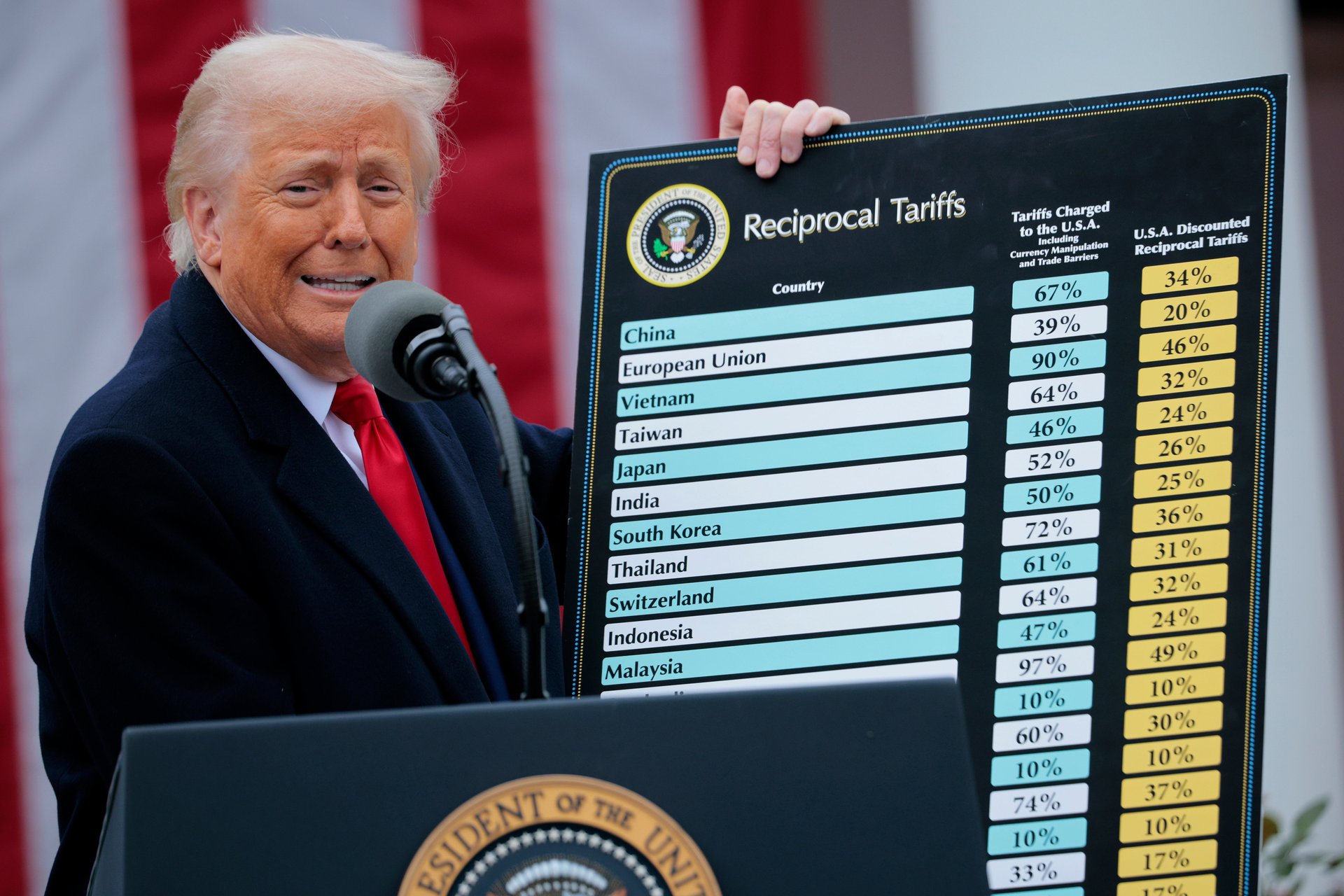3 ways Big Tech is vulnerable to European tariff retaliation
The European Union has a variety of tools in its arsenal to hit Silicon Valley where it hurts

President Donald Trump announced widespread tariffs on Wednesday, sending the stock market plunging. One of the more significant of these tariffs is a 20% levy on goods coming from longtime U.S. ally and trade partner the European Union.
Suggested Reading
EU chief Ursula von der Leyen in a press conference on Thursday said the bloc is finalizing a package of retaliatory tariffs on up to roughly $28.4 billion worth of U.S. goods in response to the 25% tariffs on steel and aluminum that took effect last month.
Related Content
While the E.U. is prioritizing negotations, Von der Leyen said the Commission is also now preparing for “further countermeasures” if discussions fail. Negotiation efforts by the bloc have so far been rebuffed by the Trump administration.
The first set of countermeasures will be announced on April 14, EU parliamentary trade committee chair Bernd Lange told German broadcaster Deutsche Welle on Thursday, with the second set likely to come in a month.
These countermeasures could target large tech firms, according to European government officials.
French government spokesperson Sophie Primas said the EU’s response would “attack online services,” while German economy minister Robert Habeck said everything is on the table when it comes to countermeasures, adding: “The big tech companies have an incredible dominance in Europe and are largely exempt from European taxes.”
Europe can zero in on antitrust probes
Relations between the EU and U.S. have been growing sour, particularly since Trump’s election in November. Trump and other administration officials including FTC Chair Andrew Ferguson, are vocally upset about Europe’s antitrust crackdown on American Big Tech companies, something the administration views as “overseas extortion and unfair fines and penalties.”
Apple (AAPL), Alphabet (GOOGL), Amazon (AMZN), Meta (META), and Microsoft (MSFT) were among the major tech names classified as “gatekeepers” under the 2022 Digital Markets Act, a landmark European antitrust law intended to address anti-competitive practices in the tech industry.
All of the magnificent seven tech stocks are down today on the tariffs news. Leading the drop is Apple.
Just last month, Google and Apple were found in violation of the DMA, and were sent preliminary findings and action requests respectively. If the companies fail to comply with the orders, they face potential fines, including a fine for Alphabet that would amount to up to 10% of its worldwide revenue. In 2024, Alphabet’s worldwide revenue reached approximately $350 billion.
The European Commission is expected to issue its first fines under the DMA to Apple and Meta very soon, Politico reported earlier this week. The wider trade environment has factored into EU’s decision on the matter, even though the act is technically overseen by the European Commission’s competition and digital directorates, according to Politico, which cited a person briefed on the matter.
Meta CEO Mark Zuckerberg and other company executives have been asking Trump and his trade officials to pressure Brussels to drop the anticipated fines and a cease-and-desist order, according to a Wall Street Journal report from Monday. Meta is reportedly worried that the EU could ask it to sell less personalized ads on it platforms, according to the WSJ, which could undercut its revenue in the region.
“Europe is likely to fight back. It is not likely to withdraw its antitrust and DMA enforcement against the American firms. But whether Trump’s bullying will chill Europe’s enforcement, we have to wait and see. Europe wants to stand firm,” legal scholar and New York University professor of trade regulation Eleanor Fox told Quartz, calling the antitrust probes “entirely legitimate.”
Europe has shown that “they’re willing to step back,” and “reinterpret the penalties that might be involved,” Brookings senior fellow Dan Hamilton said. But if this scales into a “full blown trade war,” the bloc would not shy away from levying major fines on the companies that could even go beyond the antitrust probes.
Europe’s real “bazooka”
A greater threat to Silicon Valley in the EU’s arsenal is the “anti-coercion instrument,” often referred to as a “bazooka.” Created during Trump’s first term but used mainly against China thus far, the ACI allows the EU to impose trade restrictions on services, intellectual property rights, and foreign direct investment if a country is deemed to be using tariffs on goods to coerce policy changes in the EU.
The law is used mostly as a deterrent, but it can be utilized against U.S. tech giants that provide digital services, like Apple, Google, and Meta.
Even in that case, however, Hamilton says it can take “months and months” for the EU to conduct an investigation and get a qualified majority to agree on enacting the ACI.
An attack on the services economy would hurt U.S. companies big time.
“Europe’s where they make their money, it’s the most profitable place in the world for U.S. companies,” Hamilton said, before adding that the services economies of Europe and the U.S. are so deeply intertwined that it will likely hurt Europeans as well.
Tariffs could be the least of Big Tech’s worries
Hamilton says the real problem at hand for Big Tech is not even retaliatory tariffs, but potential court orders over data privacy.
U.S. data privacy frameworks have been invalidated by EU courts in the past over being deemed not private enough for European data. To address that, former President Joe Biden signed a Data Privacy Framework with the EU that puts significant importance on an oversight board that would ensure alignment with EU data protection standards. In January, Trump fired all three Democrats on the bipartisan oversight board, stirring concern in the European Parliament.
If deemed inadequate, EU courts have the power to shut down data flows across the Atlantic.
Any court decision as such would have “far more serious” implications than any fine, Hamilton said.